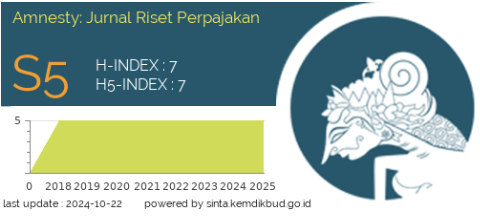Modernization System Taxation in the Midst of the Digital Economy Wave : A Study Literature
Abstract
Keywords
Full Text:
PDFReferences
Blog Door. (2022). Digital economy: Definition and current trends. Retrieved from https://www.pintublog.com/economic-digital
Door . (nd). Definition, characteristics and examples of the digital economy. Retrieved from https://www.pintublog.com/pengertian-economic-digital
Egidia , AA, & Muhammad, IW (nd). Changes in the economic market for buying and selling, the future of online and offline trade transactions in Indonesia. Retrieved from https://www.example.com .
Ekonomi.bisnis.com. (nd). Digital economy: Benefits, characteristics, developments, and challenges. Retrieved from https://economic.bisnis.com/economic-digital
Ejurnal.univamedan.ac.id. (nd). Digital economy: Characteristics, examples, and benefits. Retrieved from https://ejurnal.univamedan.ac.id/economic-digital
Ertz, M., & Boily , M. (2019). The digital economy: Promise and peril in the age of networked intelligence. Springer.
Goel, A., & Goel, S. (2018). Rules on traditional international source-based taxation. Routledge.
Indonesian Banking Development Institute. (2020). Equalization levy: Tax for digital companies. Retrieved from https://www.lpbi.or.id/equalization-levy
Indonesian Banking Development Institute. (2020). Innovation of tax regulations in the digital era. Retrieved from https://www.lpbi.or.id/inovasi-regulation
Indonesian Banking Development Institute. (2020). The development of e-payment amidst challenges. LPPI. [PDF]. Retrieved from https://www.lpbi.or.id/e-payment-challenges
Indonesian Tax Expert. (2023). Advantages and efficiency of the e-payment system. Retrieved from https://www.expertxindonesia.com/e-payment
Indonesian Tax Expert. (2023). Artificial intelligence in the tax system. Retrieved from https://www.expertxindonesia.com/ai-perpajakan
Indonesian Tax Expert. (2023). Blockchain for transparency and security of tax transactions. Retrieved from https://www.expertxindonesia.com/blockchain
Indonesian Tax Expert. (2023). The use of big data in taxation. Retrieved from https://www.expertxindonesia.com/big-data
Indonesian Tax Expert. (2023). Transformation of the tax system in the era of the digital economy. Indonesian Tax Expert.
Laurinaitis, K., et al. (2020). Taxation systems for e-commerce companies. Palgrave Macmillan.
Lucas-Mas, A., & Janquera -Varela, M. (2021). Digital economy: A new paradigm in economic activities. Springer.
Ministry of Communication and Informatics. (2014). Indonesian online transaction report 2014. Retrieved from https://www.kominfo.go.id/report-2014
Ministry of Communication and Information. (nd). Ministry of Communication and Information: Indonesia's e-commerce growth reaches 78%. Retrieved from https://www.kominfo.go.id/perkerjaan-ecommerce
Ministry of Finance. (2018). Modernization of tax administration: E-filing system. Retrieved from https://www.kemenkeu.go.id/modernization-pajak
OECD. (2015). The digital economy: Opportunities and challenges for government. OECD Publishing.
Ortax . (2020). Cross-border tax challenges in the digital era. Retrieved from https://www.ortax.org/pajak-lintas-batas
Ortax . (2020). Transformation of the tax system in the digital era. Retrieved from https://www.ortax.org/transformation-2020
Singh, R. (2014). Concept of permanent establishment (PE) in international tax law. Wolters Kluwer.
Spinosa, M., & Chand, A. (2018). New nexus: Digital permanent establishment. Oxford University Press.
Tbrights.com. (nd). Tax optimization on the digital economy: Challenges and opportunities. Retrieved from https://www.tbrights.com/optimization-pajak
DOI: https://doi.org/10.26618/jrp.v7i2.16558
Refbacks
- There are currently no refbacks.

This work is licensed under a Creative Commons Attribution-NonCommercial-NoDerivatives 4.0 International License.
View My Stats




12.jpg)